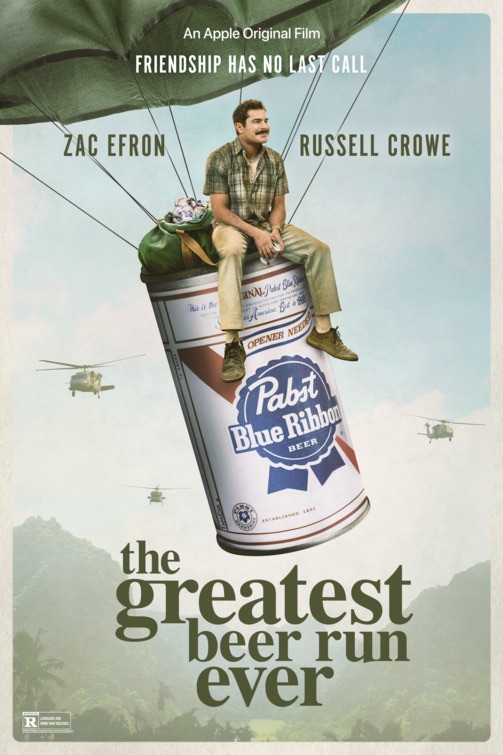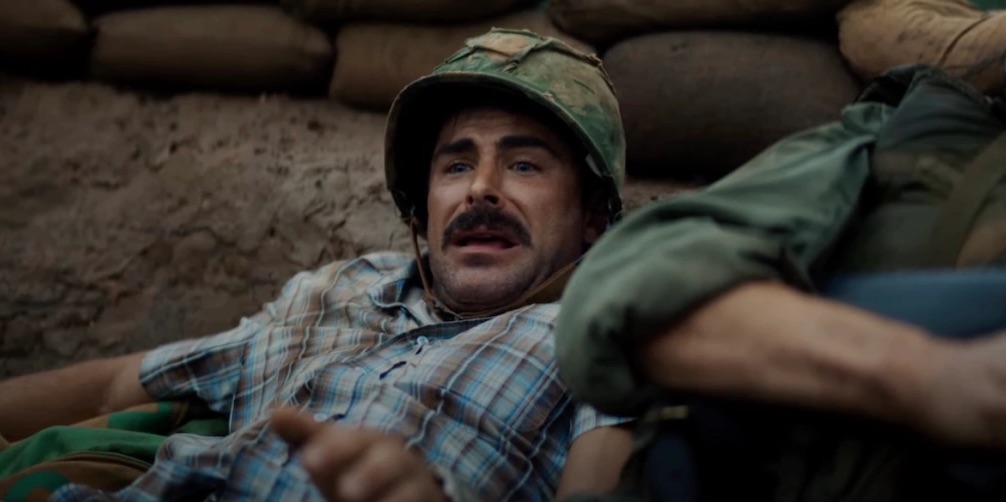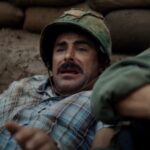There’s a fascinating true story behind The Greatest Beer Run Ever, the type of tale a man drinks out on for the rest of his life. Unfortunately, director Peter Farrelly turns it into the cinematic equivalent of a good brew gone skunked.
Zac Efron stars as John “Chickie” Donohue, a layabout and occasional Merchant Marine who takes up space in his parents’ apartment when he’s not at the corner bar with his buds. It’s the height of the Vietnam War, and Chickie’s watched as many of his buddies have gone overseas. He’s tired of the protests at home, which he feels dishonors their service, and when the bartender (Bill Murray) at his local watering hole says they all deserve a cold one, Chickie makes a drunken promise to deliver a duffel bag of Pabst Blue Ribbon.

It’s a story that might make for a delightful documentary, but Farrelly (whose last film was the 2018 Oscar winner Green Book) turns it into a flatter version of Good Morning Vietnam. Chickie heads off and has a series of adventures trying to track down his buddies. In the process, he learns that the conflict is a bit more chaotic than he suspected.
Efron gives a solid performance, even if the film makes the baffling decision to have Chickie and all his New York pals speak with Boston accents. The actor has the charisma to sell the likability that helps Chickie charm his way across enemy lines, but there’s also the slight suggestion of insecurity and self-loathing that creeps in. Chickie’s promise to bring the beers is fueled by a night of drunken revelry, but what really gets him on the ship is the realization no one believes he has the follow-through to go. As he learns that the war is more complex than he thought, Efron underplays incredulity in favor of embarrassment, playing it as a man realizing his own apathy has pulled the wool over his eyes.
The rest of the cast is fine but unremarkable. Murray and Crowe saunter on for a few scenes to collect a paycheck. Chickie’s bar buddies feel like sitcom stock characters; one who constantly flip-flops in his political views feels straight from Saturday Night Live. The soldiers Chickie visits are unmemorable, and there’s never much sense of camaraderie. When pictures of the real Chickie and his friends are shown over the end credits, it’s supposed to be moving, but aside from Chickie, none of the characters are given much chance to develop.
Farrelly acquits himself fine in the film’s few moments of tension, and the film is handsomely photographed. The soundtrack is, as expected, filled with 1960s needledrops, but at least he stays away from The Doors. As a comedy-drama, the film is perfectly adequate, particularly when it’s focused on Chickie’s development. When the film attempts to say something about Vietnam, it falters, going broad with its depictions of cultural upheaval. It feels 50 years and several genuinely great films too late for a filmmaker to take the stance that, hey, maybe Vietnam was a bit of a mess.

Zac Efron in “The Greatest Beer Run Ever.” Photo courtesy Apple TV+.
But in an age where blind patriotism has led many to ignore reality, The Greatest Beer Run Ever has a few moments of relevance. It’s slightly more successful as a story about a man realizing the wrongness of his own views. But the script by Farrelly, Brian Hayes Currie and Pete Jones tends to shove platitudes down the audience’s throat instead of finding subtle parallels between Chickie’s story and our own curdled modern politics. When Chickie blurts out “you have to respect the office” while defending LBJ or a war correspondent (Russell Crowe) talks about the importance of reporting the truth, all that’s missing is a flashing chyron saying “THIS IS TALKING ABOUT TODAY.” It’s not that Farrelly’s message is incorrect or unneeded, but his delivery is over the top. Of course, the Fox News demo that’s being taken in by conspiracy theories, which is much of the same demographic interested in a Vietnam film, might need a film that makes its points very plain and wraps its screeds in a boomer-friendly story.
When The Greatest Beer Run Ever focuses on Chickie’s bonkers attempt to bring suds to his buds — a gesture the film reminds us is stupid and pointless (especially because beer wasn’t exactly unavailable in Vietnam) — it achieves a shaggy charm. Chickie’s an affable protagonist and the film is best as an outlandish comedy. Particularly entertaining is how Chickie leans on Army paranoia about CIA agents masquerading as civilians to get from point A to LZ J. The film takes liberties with Chickie’s story; in real life, his adventures took two months, not three days (and he had to buy more beer in Saigon), and it’s doubtful the CIA was trying to kill him.
The Greatest Beer Run Ever is perfectly perfunctory, a formulaic drama that finds a few moments of warmth. It’s the type of film you want to have a beer with; it’s just that like many drinking buddies, after a few too many, it lectures, condescends and becomes a bit unbearable.

| Producer: | David Ellison, Dana Goldberg, Don Granger, Andrew J. Muscato, Jake Myers |
| Release Date: | September 30, 2022 |
| Running Time: | 126 minutes |
| Starring: | Zac Efron, Russell Crowe, Bill Murray, Kyle Allen, Jake Picking, Will Hochman, Archie Renaux, Kristin Carey, Pedro Correa, Will Ropp |
| User Rating: | |
| Writer: | Peter Farrelly, Brian Hayes Currie, Pete Jones |
| MPAA Rating: | R (for language and some war violence) |
| Director: | Peter Farrelly |
| Distributor: | Apple TV+ |
| External Info: | Official Site |
